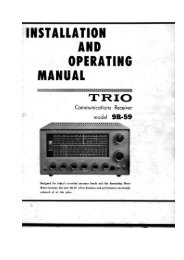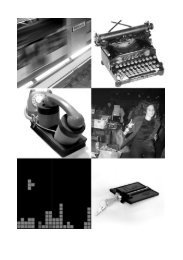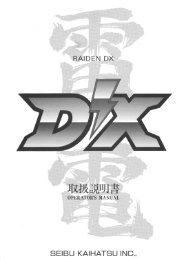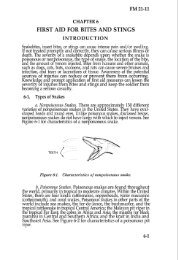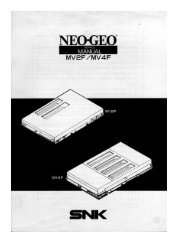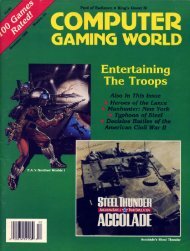Why Game? 1 - TextFiles.com
Why Game? 1 - TextFiles.com
Why Game? 1 - TextFiles.com
Create successful ePaper yourself
Turn your PDF publications into a flip-book with our unique Google optimized e-Paper software.
so what’s the point of saving after having a<br />
discussion anyway?<br />
Of course, such a unique system is open<br />
to abuse. The final section of the game - which<br />
leads to the final guardian and the ending - will<br />
take no longer than 45 minutes to <strong>com</strong>plete as-<br />
suming you start from that original shrine visited<br />
earlier, and assuming, of course, that you have<br />
all the knowledge needed to locate and defeat<br />
said enemy. The chances of stumbling across<br />
this accidentally are virtually zero, but there will<br />
always be the temptation for some to skip out<br />
on the 40+ hours of questing, visit <strong>Game</strong>FAQs<br />
for spoilers, and then rush ahead and <strong>com</strong>plete<br />
the game in under an hour.<br />
There are ways to avoid such things, but<br />
the great hope is that the reason for purchasing<br />
the game is not what you find at the end, but<br />
rather the journey you take to get there. Plus, of<br />
course, the final area can have a quiz designed<br />
to test if you’d actually played that far yourself.<br />
For example, there may be a section mid-way<br />
that features some antics on a wrecked pirate<br />
ship; a doppelganger of the ship may be pres-<br />
ent at the end, and if the player doesn’t use his<br />
foreknowledge of said area, then it’s instantly<br />
<strong>Game</strong> Over. The trick to would be subtlety; per-<br />
haps it’s an entirely different ship, but hopefully<br />
the player will heed the warnings of a naviga-<br />
tor’s ghost met previously, who clearly states<br />
the rules for navigating all future ships. The<br />
point is that they remember and work out what<br />
needs doing. Knowledge is key in this game and<br />
this key is worth more than all the Gil in Midgar.<br />
Another element that slows sequence-<br />
breaking is the presence of red herrings<br />
designed to lead people astray when experi-<br />
menting. If only key elements pertaining to the<br />
quest exist, it may eventually be<strong>com</strong>e fairly<br />
easy to stumble across solutions. If you find a<br />
giant statue hidden in the desert, it must obvi-<br />
ously have some importance later on - unless of<br />
course the game is riddled with things to side-<br />
track the player. Just for fun, why not include a<br />
wholly superfluous city floating in the sky? When<br />
players see it, they will be gripped by curiosity,<br />
62 The <strong>Game</strong>r’s Quarter Issue #3<br />
desperate to see how it fits into the main quest.<br />
Of course, exploring it will yield little more than<br />
narrative explanations, but such things should<br />
keep players guessing at to what happens next,<br />
and encourage them to “stick to the path” that<br />
they are given.<br />
On the flipside, such things could encour-<br />
age longevity. Since once the main quest is<br />
beaten, dedicated players will be curious to find<br />
the truth behind so many things hinted at past<br />
the main path. In the same way that people<br />
were fascinated by the airships and distant lands<br />
they couldn’t reach in Shadow of the Beast and<br />
the ghost city in GTA, so will they be interested<br />
in the city in the sky. Some may baulk at such<br />
ideas, arguing that there would be no replay<br />
value to such a game, but I argue the replay<br />
value would be greater than in any similar<br />
game. In other RPGs, great set pieces – such as<br />
the coastline battle in FF7 - may require a dozen<br />
hours of play time to reach. But in Szczepaniak’s<br />
Grand Quest, all your favourite set-piece events<br />
are no more than 15-30 minutes away from<br />
the start, meaning you can easily relive “the<br />
great battle of unholy vengeance” that occurs<br />
mid-game atop a floating battle fortress without<br />
having to play through everything else again.<br />
The final game would be delicate, dripping<br />
with atmosphere, and be pure and ergonomic<br />
with regards to controls, real-time <strong>com</strong>bat and<br />
inventory management. An ethereal atmo-<br />
sphere such as that in Otogi, Zelda, or Shadow<br />
of Colossus would be key, since without clear<br />
achievements such as leveling and item acquisi-<br />
tion, the player would need to be motivated by a<br />
sense of exploration and the innate joy received<br />
from piecing together clues. It would almost be<br />
like a Sherlock Holmes mystery for the modern<br />
day, with each clue leading onto another, even-<br />
tually forming a whole picture. Of course, once<br />
you have a certain clue, you can skip past all<br />
those that came before when you next switch on<br />
your ’Cube.<br />
Sadly, such a game will never be made.<br />
Can you imagine pitching it to a publisher?<br />
“Well, it’s like an RPG, but not. And it’s




